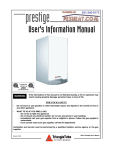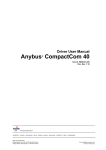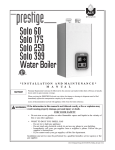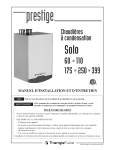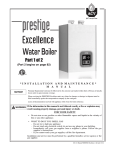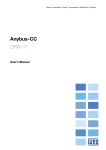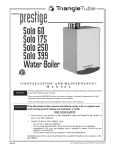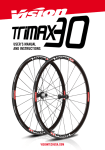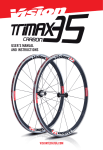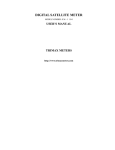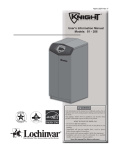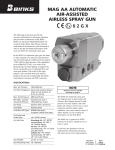Download Prestige User Manual
Transcript
prestige User s Information Manual If the information in this manual is not followed exactly, a fire or explosion may WARNING result causing property damage, personal injury or loss of life. FOR YOUR SAFETY • Do not store or use gasoline or other flammable vapors and liquids in the vicinity of this or any other appliance. • WHAT TO DO IF YOU SMELL GAS - Do not try to light any appliance - Do not touch any electrical switch; do not use any phone in your building. - Immediately call your gas supplier from a neighbor’s phone. Follow the gas supplier’s instructions. - If you cannot reach your gas supplier, call the fire department. Installation and service must be performed by a qualified installer, service agency or the gas supplier. Revised 3/1/13 2011-58 Prestige User’s Manual Table of Contents PRODUCT & SAFETY INFORMATION Page 1 Service and Maintenance PRESTIGE Operation Boiler & System Water SECTION I - Combustion Air - Prevention of Contamination Page 2 Potential Contaminating Products Areas likely to find these Products SECTION II - Maintenance Schedule Page 3 Service Technician Owner Maintenance SECTION III - Maintenance Procedures Page 4 Daily Maintenance Monthly Maintenance 6-Month Maintenance SECTION IV - Operations Instructions Page 7 SECTION V - TriMax Operation Page 8 Replacement Parts Page 20 The following terms are used throughout this manual to bring attention to the presence of potential hazards or to important information concerning the product. NOTICE WARNING Indicates a potentially hazardous situation, which if ignored, can result in death, serious injury or substantial property damage. Indicates special instructions on installation, operation or maintenance, which are important to equipment but not related to personal injury hazards. CAUTION Indicates a potentially hazardous situation which, if ignored, may result in minor injury or property damage. i Product & Safety Information PRESTIGE Operation PRODUCT & SAFETY INFORMATION • Do not block flow of combustion air to the PRESTIGE. If the combustion air blockage is easily accessible and removable, then remove it. If blockage is not obvious or cannot be removed, have the unit and system checked by a qualified service technician. • Do not allow contaminated air to enter the unit’s combustion air inlet. See page 2 for details. • The PRESTIGE is equipped with a low water cutoff device. The boiler and system piping must be filled and pressurized to 12 psig prior to startup. The unit will shut down if the pressure falls below 10 psig. • Should overheating occur or the gas supply fail to shut off, DO NOT turn OFF or disconnect the electrical supply to the pump. Instead, shut off the gas supply at a location external to the appliance. • Do not use this unit if any part has been under water. Immediately call a qualified service technician to inspect the boiler and to replace any part of the control system and any gas control, which has been under water. WARNING HOMEOWNER: The PRESTIGE installation manual is for use only by a qualified heating installer / service technician. Refer to this User’s Information Manual for your reference. Failure to comply could result in severe personal injury, death or substantial property damage. NOTICE TECHNICIAN: When calling or writing about the PRESTIGE, please have the boiler model and serial number available. STOP! READ BEFORE SERVICING WARNING Boiler & System Water Failure to adhere to the guidelines on this page can result in severe personal injury, death or substantial property damage. • Have the boiler and system water chemistry checked at least annually by a qualified service technician. • Do not use petroleum-based cleaning or sealing compounds in the boiler or system. Gaskets and seals in the system may be damaged. This can result in substantial property damage. • Do not use any product not specifically designed for boiler / hydronic heating systems. Serious damage to the unit, piping system, personnel and / or property may result. • Continual fresh makeup water will reduce the life of the PRESTIGE. Addition of oxygen can cause internal corrosion in the system components. All leaks in the piping system must be repaired at once to prevent makeup water. • Do not add cold water to a hot unit. Thermal shock can cause premature failure to the boiler heat exchanger. Service and Maintenance • To avoid electric shock, disconnect electrical supply before performing service or maintenance. • Allow the unit to cool down prior to servicing to avoid severe burns. • The PRESTIGE must be maintained as outlined in this manual and have at least annual service performed by a qualified service technician to ensure unit / system reliability. 1 Combustion Air - Prevention of Contamination SECTION I - COMBUSTION AIR - PREVENTION OF CONTAMINATION Potential Contaminating Products WARNING If the PRESTIGE combustion air inlet is located in any area likely to cause or contain contamination, or if products, which would contaminate the air cannot be removed, the combustion air must be re-piped and terminated to another location. Contaminated combustion air will damage the unit and its burner system, resulting in possible severe personal injury, death or substantial property damage. WARNING Do not operate a PRESTIGE unit if its combustion air inlet or the unit is located in or near a laundry room or pool facility. These areas will always contain hazardous contaminates. Pool and laundry products and common household and hobby products often contain fluorine or chlorine compounds. When these chemicals pass through the burner and vent system, they can form strong acids. These acids can create corrosion of the heat exchanger, burner components and vent system, causing serious damage and presenting a possible threat of flue gas spillage or water leakage into the surrounding area. - Spray cans containing chloro/fluorocarbons - Permanent Wave Solutions - Chlorinated wax - Chlorine - based swimming pool chemicals and spa cleaners - Calcium Chloride used for thawing ice - Sodium Chloride used for water softening - Refrigerant leaks - Paint or varnish removers - Hydrochloric acid / muriatic acid - Cements and glues - Antistatic fabric softeners used in clothes dryers - Chlorine-type bleaches, detergents, and cleaning solvents found in household laundry rooms - Adhesives used to fasten building products and other similar products Areas likely to find these products Please read the following information. If contaminating chemicals will be present near the location of the combustion air inlet, the installer should pipe the combustion air inlet to another location per the PRESTIGE installation manual. 2 - Dry cleaning / laundry areas and establishments - Beauty salons - Metal fabrication shops - Swimming pools and health spas - Refrigeration Repair shops - Photo processing plants - Auto body shops - Plastic manufacturing plants - Furniture refinishing areas and establishments - New building construction - Remodeling areas - Garages with workshops Maintenance Schedule SECTION II - Maintenance Schedule Owner Maintenance Service Technician Periodically: At least on an annual basis the following maintenance should be performed by a qualified service technician: - Check the area around the unit. - Check and remove any blockage from the combustion air inlet and ventilation openings. - Check the temperature/pressure gauge. General - Attend to any reported problems. - Inspect the interior of the boiler jacket area; clean and vacuum if necessary. - Clean the condensate trap and fill with fresh water. - Check boiler water pH on systems with inhibitors and/or antifreeze. - Monthly: - Check vent piping. - Check combustion air inlet piping. - Check the pressure relief valve. Check for leaks: water, gas, flue and condensate. - Check the condensate drain system. - Verify flue vent piping/gaskets and air inlet piping are in good condition, sealed tight and properly supported. Every 6 months: - Check boiler water pressure, piping and expansion tank. - Check boiler piping and gas supply piping for corrosion or potential signs of leakage. - Check control settings. - Operate the pressure relief valve. - Check ignition electrode (sand off any white oxide; clean and reposition). - Check ignition wiring and ground wiring. - Check all control wiring and connections. - Check burner flame pattern (stable and uniform). WARNING Follow the maintenance procedures given throughout this manual. Failure to perform the service and maintenance or follow the directions in this manual could result in damage to the PRESTIGE or in system components, resulting in severe personal injury, death or substantial property damage. Additional items if combustion or performance is poor: - Clean heat exchanger and flue ways. - Remove burner assembly and clean burner head using compressed air only. Once the maintenance items are completed, review the service with the owner. 3 Maintenance Procedures SECTION III - MAINTENANCE PROCEDURES 1. Combustible / flammable materials - Do not store combustible materials, gasoline or other flammable vapors or liquids near the unit. Remove immediately if found. WARNING 2. Air contaminates - Products containing chlorine or fluorine, if allowed to contaminate the combustion air, will cause acidic condensate within the unit. This will cause significant damage to the unit. Read the list of potential materials listed on page 2 of this manual. If any of these products are in the room from which the unit takes its combustion air, they must be removed immediately or the combustion air intake must be relocated to another area. The PRESTIGE must be inspected and serviced annually, preferably at the start of the heating season, by a qualified service technician. In addition, the maintenance and care of the boiler as outlined on page 3 and further explained on pages 4 through 6 must be performed to assure maximum efficiency and reliability of the unit. Failure to service and maintain the PRESTIGE and the system components could result in equipment failure, causing possible severe personal injury, death or substantial property damage. Check Combustion Air Inlets 1. Verify that ventilation air openings to the mechanical room are open and unobstructed. NOTICE 2. Verify that the unit’s vent termination and combustion air intake are clean and free of obstructions. Remove any debris on the air intake or flue exhaust openings. If removing the debris does not allow the unit to operate correctly, contact your qualified service technician to inspect the unit and the vent / combustion air system. The following information provides detailed instruction for completing the maintenance items outlined in the maintenance schedule on page 3. In addition to this maintenance, the PRESTIGE should be serviced at the beginning of the heating season by a qualified service technician. Check Temperature Display and Pressure Gauge Daily Maintenance Check the Surrounding Area 1. Ensure the pressure reading on the pressure gauge does not exceed 25 psig. Higher pressure readings may indicate a problem with the expansion tank. WARNING 2. Ensure the temperature on the display panel does not exceed 194ºF. Higher temperature readings may indicate a problem with the operating thermostat controls. To prevent potential of severe personal injury, death or substantial property damage, eliminate all the materials listed on page 2 from the area surrounding the unit and from the vicinity of the combustion air inlet. If contaminates are found: 3. Contact a qualified service technician if problem persists. Remove products immediately from the area. If they have been there for an extended period, call a qualified service technician to inspect the unit for possible damage from acid corrosion. If products cannot be removed, immediately call a qualified service technician to re-pipe the combustion air inlet piping and locate the combustion air intake away from the contaminated areas. 4 Maintenance Procedures Monthly Maintenance WARNING Check Vent Piping Under some circumstances the PRESTIGE may not produce enough condensate to keep the condensate trap full of liquid. If the trap is not full, small amounts of flue gases can be emitted into the surrounding area through the condensate drain line or tee. 1. Visually inspect the flue gas vent piping for any signs of blockage, leakage or deterioration of gaskets. Notify a qualified service technician immediately if any problems are found. 3. Ensure the condensate drain line is not blocked by pouring water through the plug port on the condensate drain assembly. The water should flow out of the end of the drain line. If water does not appear at the end of the drain line, contact a qualified service technician to inspect and clean the condensate line. WARNING Failure to inspect the venting system as noted and have it repaired by a qualified service technician can result in the vent system failure, causing severe personal injury or death. 4. To fill the condensate drain assembly, if necessary, remove the plug from the condensate assembly. Slowly pour water into the trap assembly until water appears at the end of the drain line. Stop filling and replace plug. Check Combustion Air Inlet Piping 1. Visually inspect the combustion air inlet piping for any signs of blockage. Inspect the entire length of the combustion air inlet piping to ensure piping is intact and all joints are properly sealed. Check Automatic Air Vents (If Used) 1. Remove the cap “A” from any automatic air vent in the system and check operation by depressing valve “B” slightly with the tip of a screwdriver. See Fig. 1. 2. Notify a qualified service technician if any problems are found. Check Pressure Relief Valve 2. If the air vent valve appears to be working freely and not leaking, replace cap “A”, screwing it on fully. 1. Visually inspect the primary pressure relief valve and the relief valve discharge pipe for signs of weeping or leakage. 3. Loosen cap “A” one full turn to allow vent to operate properly. 2. If the pressure relief valve often weeps, the expansion tank may not be operating properly. Immediately contact a qualified service technician to inspect the unit and system. 4. Have the air vent replaced by a qualified service technician if it does not operate correctly. Check Vent Condensate Drain System A 1. While the unit is running, check the discharge end of the condensate drain tubing. Ensure no flue gas is leaking from the condensate drain tubing or tee connection by holding your fingers near the opening. 2. If you notice flue gas leaking from the opening, this indicates a dry condensate drain trap. Fill the condensate trap assembly. Contact a qualified service technician to inspect the unit and condensate line and refill the condensate trap if problem persists regularly. B Fig. 1: Automatic Air Vent 5 Maintenance Procedures 2. Read the temperature display and pressure gauge to ensure the system is pressurized. Lift the relief valve top lever slightly, allowing water to relieve through the valve and discharge piping. 6-Month Maintenance Check Water and Gas Piping 3. If water flows freely, release the lever and allow the valve to seat. Watch the end of the relief valve discharge pipe to ensure that the valve does not weep after the line has had time to drain. If the valve weeps, lift the lever again to attempt to clean the valve seat. If the valve does not properly seat and continues to weep afterwards, contact a qualified service technician to inspect the valve and system. 1. Remove the boiler front jacket panel and perform a gas leak inspection per steps 1 through 6 of the Operating Instructions on page 7. If gas odor or leak is detected, immediately shut down the unit following procedures on page 7. Call a qualified service technician. 2. Visually inspect for leaks around the internal boiler water connections and around the heat exchanger. Visually inspect the external system piping, circulators, and system components and fittings. Immediately call a qualified service technician to repair any leaks. 4. If the water does not flow from the valve when you lift the lever completely, the valve or discharge line may be blocked. Immediately shut the unit down per the instructions on page 7. Call a qualified service technician to inspect the valve and system. WARNING Have leaks fixed at once by a qualified service technician. Failure to comply could result in severe personal injury, death or substantial property damage. Operate Pressure Relief Valve 1. Before proceeding, verify that the relief valve outlet has been piped to a safe place of discharge, avoiding any possibility of scalding from hot water. WARNING To avoid water damage or scalding due to valve operation, a discharge line must be connected to the relief valve outlet and directed to a safe place of disposal. This discharge line must be installed by a qualified service technician or heating / plumbing installer in accordance with the PRESTIGE installation manual. The discharge line must be terminated so as to eliminate possibility of severe burns or property damage should the valve discharge. 6 Operating Instructions SECTION IV - OPERATING INSTRUCTIONS FOR YOUR SAFETY READ BEFORE LIGHTING WARNING If you do not follow these instructions exactly, a fire or explosion may result causing property damage, personal injury or loss of life. A. This appliance does not have a pilot. It is equipped with an ignition device which automatically lights the burner. DO NOT try to light the burner by hand. B. BEFORE OPERATING, smell all around the appliance area for gas. Be sure to smell next to the floor because some gas is heavier than air and will settle on the floor. • If you cannot reach your gas supplier, call the fire department. WHAT TO DO IF YOU SMELL GAS • Do not try to light any appliance. C. Use only your hand to turn the external manual gas valve. Never use tools. If the valve will not turn by hand, don’t try to repair it; call a qualified service technician. Force or attempted repair may result in a fire or explosion. D. Do not use this appliance if any part has been under water. Immediately call a qualified service technician to inspect the appliance and to replace any part of the control system and any gas control which has been under water. • Do not touch any electric switch; do not use any phone in your building • Immediately call your gas supplier from a neighbor’s phone. Follow the gas supplier’s instructions. OPERATING INSTRUCTIONS 1. STOP! Read the safety information above. This appliance is equipped with an ignition device which automatically lights the burner. DO NOT try to light the burner by hand. 2. Set room thermostat(s) to lowest setting. Turn the external manual gas valve handle clockwise “CLOSE” (valve handle shall be perpendicular to gas piping). 3. Turn the service switch on the PRESTIGE control panel OFF. 4. Remove the front jacket panel on the unit. 5. Turn the external manual gas valve handle counter clockwise to “OPEN” gas supply (valve handle shall be parallel to gas piping). 6. Wait five (5) minutes to clear out any gas. If you then smell gas in the jacket enclosure or around the unit, STOP! Follow “B” in the safety information above. If you don’t smell gas, go to the next step. 7. Turn the service switch on the PRESTIGE control panel “ON”. 8. Set room thermostat(s) to desired setting(s). 9. The PRESTIGE control panel display will show the current operating status on the Status Line at the bottom of the screen. “Standby” means there is no call for heat (all thermostats are satisfied). “CH Demand” indicates a space heating call has been received. “DHW Demand” indicates a domestic hot water call has been received. A flame icon will be displayed when the unit is fired. 10. If the unit will not operate with a call for heat and the system piping is not hot, follow the instructions “To Turn Off Gas to Appliance”, below and call your service technician or gas supplier. 11. Replace the front jacket panel. Make sure the panel is seated firmly in place and all mounting screws are tightened. TO TURN OFF GAS TO APPLIANCE 1. Set the room thermostat to lowest setting. 2. Turn the service switch on the PRESTIGE control panel to “OFF” 3. 7 Turn the external manual gas valve handle clockwise to “CLOSE”. TriMax Operation SECTION V - TRIMAx OPERATION The TriMax Boiler Management System is designed to be flexible yet easy to use. TriMax monitors and controls the Prestige to provide heat as efficiently as possible. All TriMax features are easy to use through a graphical display where information is presented either graphically or in plain English, so code charts are not required. Navigation is performed through four arrow buttons UP, DOWN, LEFT, RIGHT with a center OK button for making selections and entering information. The INSTALLER button (the small round button) provides the installing contractor with full access to all available features after entering a password. Figure 2 – TriMax Navigation Buttons The Main Menu can be entered from the Home Screen by pressing the OK button. The menu system utilizes icons to represent each selection. The current selected menu is displayed as a reversed image with a text description shown at the top of the display. Menus can be entered by highlighting the desired icon and pressing the OK button. The Home Screen icon at the bottom of each screen returns to the Home Screen when selected. The Previous Screen icon at the bottom of each screen returns to the previous screen when selected. 8 TriMax Operation TriMax Menu Structure Home Screen Main Menu EZ Setup Menu CH/DHW Operation Menu Heating Enabled Boiler Information Menu Boiler Information b bbb f bbb b bb f ed cebd cba de f b b ed cba a abcc de f ab d e abc b bbb f ed bbb b bb f ed cb cba de f a abc de f bb d cba gb c b f a d abc 9 TriMax Operation Home Screen The Home Screen presents status information in a very user friendly way so that the current state of the boiler can be quickly accessed. The Prestige is represented in the center of the Home Screen. Basic operating information such as supply and return temperatures are displayed as well as current burner status. A flame symbol is displayed when the unit is fired. The flame size changes to indicate the current firing rate. The radiator icon indicates that a central heating call has been received. A small number 1 or 2 indicates which CH calls are active. 1 2 Circulator icons indicate which circulators are currently powered. The faucet icon indicates that a domestic hot water call has been received. This line provides basic information. The user can press the LEFT or RIGHT arrow buttons to view Target, Supply, Return, Domestic and Outdoor Temperatures. The percentage icon indicates that an external modulation call has been received. The status line displays the current operating state of the Prestige. See page 11 for a list of all Status Line Messages. The screen backlight will illuminate when any button is pressed and remain illuminated for five minutes. Press the UP or DOWN buttons to turn on the backlight while at the Home Screen without making any changes. The screen contrast can be adjusted at the Home Screen by pressing and holding the OK button then pressing and holding the LEFT arrow along with the OK button. The contrast can then be increased by pressing the UP button or decreased by pressing the DOWN button while holding in the OK button and LEFT arrow. All buttons must be released and the procedure performed again to switch between increasing and decreasing contrast. 10 TriMax Operation Status Line Messages Status Line Message Standby CH Demand DHW Demand Description Indicates that the Prestige is ready to respond when a demand is received. A central heating call has been received. A domestic hot water call has been received. CH / DHW Demand Central heating and domestic hot water calls are being received simultaneously. Both calls are being satisfied simultaneously because domestic hot water priority has been disabled. DHW Priority Central heating and domestic hot water calls are being received simultaneously. Domestic hot water call is being satisfied first because it has priority over central heating calls. Priority Timeout Central heating and domestic hot water calls are being received simultaneously. The domestic hot water priority time limit has been exceeded. Priority will now switch back and forth between central heating and domestic hot water calls until one call is satisfied. External Demand An external modulation call has been received. Slave Operation The Prestige is a slave in a cascade system. Manual Operation The burner or circulators have manually been enabled in the Installer Menu. CH Burner Delay The burner will not fire until the call blocking time has elapsed. DHW Burner Delay The burner will not fire until the call blocking time has elapsed. CH Setpoint Reached DHW Setpoint Reached The burner is not fired because the supply/system water temperature exceeds the setpoint. The central heating circulator continues to operate and the burner will fire again once the supply/system water temperature drops below the setpoint. The burner is not fired because the supply/system water temperature exceeds the setpoint. The domestic circulator continues to operate and the burner will fire again once the supply/system water temperature drops below the setpoint. CH Post Pump The central heating circulator is running to remove heat from the Prestige at the completion of a call. DHW Post Pump The domestic hot water circulator is running to remove heat from the Prestige at the completion of a call. Freeze Protection The burner is fired because the freeze protection feature has been activated. Freeze protection will end once the supply/system water temperature is raised to 60ºF [16ºC]. Boiler Protection The burner firing rate is being reduced because of an excessive difference between the boiler supply and return temperatures. The firing rate will begin increasing once the temperature difference is less than 45ºF [25ºC]. Lockout Description The lockout which currently has the Prestige shut down is displayed. 11 TriMax Operation Main Menu The Main Menu can be entered from the Home Screen by pressing the OK button. The menu system utilizes icons to represent each selection. The currently selected menu is displayed as a reversed image with a text description shown at the top of the display. Menus can be entered by highlighting the desired icon and pressing the OK button. Press OK Button Currently selected menu The CH / DHW Operation Menu can be accessed by selecting this icon. The EZ Setup menu can be accessed by selecting this icon. The Boiler Information Menu can be accessed by selecting this icon. The Previous Screen icon at the bottom of each screen returns to the previous screen when selected. The Home Screen icon at the bottom of each screen returns to the Home Screen when selected. 12 TriMax Operation CH/DHW Operation Menu The CH / DHW Operation Menu can be entered from the Main Menu by selecting the CH / DHW Operation icon and pressing the OK button. The CH / DHW Operation Menu provides a simple way to disable either the central heating or domestic hot water functions of the Prestige. CH/DHW Operation Select CH/DHW Operation Heating Enabled Domestic Hot Water Operation can be enabled and disabled by selecting the faucet icon and pressing the OK button to toggle operation between enabled and disabled. A faucet icon with an X through it indicates that the domestic hot water function is disabled. This icon is also displayed on the Home Screen when disabled. Heating Operation can be enabled and disabled by selecting the radiator icon and pressing the OK button to toggle operation between enabled and disabled. A radiator icon with an X through it indicates that the heating function is disabled. This icon is also displayed on the Home Screen when disabled. 13 TriMax Operation Boiler Information Boiler Information can be viewed by selecting the Boiler Information icon and pressing the OK button. Boiler Information provides real time operating information of the Prestige. Boiler Information b bbb f bbb b bb f ed cebd cba de f b b ed cba a abcc de f ab d e abc b bbb f ed f bbb b bb f ed cb cba c de f b b b a a e d d cba gb f abc d abc Select Boiler Information Boiler Information displays six boiler readings at a time. Each line contains an information item followed by its current value. Press the UP or DOWN buttons to scroll through additional information items. Boiler Information Standby Boiler Status No Heating Call No DHW Call 0% Boiler Firing Rate Flame ionization Current OuA __ Boiler Setpoint Select Boiler Setpoint Some information items include a logging function. Select the information item then press the OK button to view its graph. One sample is recorded every 12 minutes to produce a graph of the last 24 hours. Boiler Setpoint 194 68 -24.00 -16.00 14 -8.00 0.00 The following information items have a logging function. Boiler Firing Rate Flame Ionization Current Boiler Setpoint Boiler Supply Temperature Boiler Return Temperature Boiler Flue Temperature Outdoor Temperature DHW Storage Temperature External Modulation Signal TriMax Operation Information Items Information Item Description Boiler Status Displays the current operating state of the Prestige. This is the same as the status line on the home screen. Heating Call Displays if a central heating call is present. DHW Call Displays if a domestic hot water call is present Boiler Firing Rate Displays the current firing rate of the Prestige. Flame Ionization Current Boiler Setpoint Displays the current flame ionization current from the ignitor. Displays the current setpoint of the Prestige. Boiler Supply Temperature Displays the current supply temperature of the Prestige. Boiler Return Temperature Displays the current return temperature of the Prestige. Boiler Flue Temperature Outdoor Temperature Displays the current flue temperature of the Prestige. Displays the current outdoor temperature. DHW Storage Temperature Displays the current DHW storage temperature when Indirect Water Heater Sensor PSRKIT22 is installed. External Modulation Signal Displays the current external modulation signal being received from an external controller. CH Ignitions Displays the number of central heating ignitions since the unit was installed. This counter increases in increments of twenty. CH Runtime Displays the number of hours the Prestige has run for a central heating call since the unit was installed. DHW Ignitions Displays the number of domestic hot water ignitions since the unit was installed. This counter increases in increments of twenty. DHW Runtime Displays the number of hours the Prestige has run for a domestic hot water call since the unit was installed. 15 TriMax Operation Lockout History Lockout History can be viewed by selecting the Lockout History icon and pressing the OK button. The Lockout History Screen lists the last eight lockouts along with how long ago they occurred. Lockout History b bbb f bb f ed cebd cb ed cba a d bbb f ed bb f ed cb cb a d cba gb f bbb b de f b b abcc de f ab d e abc bbb b de f b b c b a de f abc d abc Select Lockout History Lockout History displays the last eight lockouts. The newest lockout is displayed at the top of the screen. The lockout message is followed by how long ago the error occured. Press the UP or DOWN buttons to scroll through additional lockouts. Lockout History 1: Low water 2: No error 3: No error 4: No error 5: No error 6: No error 5h ago 25h ago 25h ago 25h ago 25h ago 25h ago Select Lockout #1 Lockout Details displays the lockout at the top of the screen followed by a snapshot of the boiler information recorded at the time of the lockout. Press the UP or DOWN buttons to scroll through additional information items. Lockout Details Low Water Standby Boiler Status No Heating Call No DHW Call 0% Boiler Firing Rate Flame ionization Current OuA 16 TriMax Operation Lockout Screen The Lockout Screen replaces the Home Screen if a lockout occurs. The screen backlight will also illuminate constantly while the Prestige is locked out. Pressing any arrow button will return to the Home Screen so that additional troubleshooting can be performed. See pages 18 and 19 for a list of lockouts and descriptions. The lockout message is displayed at the top of the screen Low Water The first sentence gives a description of the lockout. The third sentence tells how to reset the lockout. Water level has fallen below an acceptable operating level. Increase pressure to normal range. Boiler will automatically reset once water level returns to normal If problem persists, call for service E37 The second sentence gives a possible cure for the lockout. The lower right corner displays the lockout reference code. Press any ARROW Button Press any ARROW button to return to the Home Screen while locked out. The Main Menu can then be entered from the Home Screen to help diagnose the problem. Select the Home Screen icon at the bottom of any menu screen to return to the Lockout Screen. -- The status line now displays the lockout 17 TriMax Operation Manual Reset Hard Lockouts Code Lockout Message E1 Failed Ignition E2 False Flame A flame is being detected prior to ignition. E3 High Boiler Temperature Boiler temperature exceeds 212°F [100ºF] E5 Blower Speed E8 Flame Circuit Error E9 Gas Valve Circuit Error E13 Reset Limit Reached E15 Sensor Drift E16 Supply Sensor Stuck Supply sensor reading is not changing. E17 Return Sensor Stuck Return sensor reading is not changing. E18 Sensor Failure E21 Internal Control Fault E30 Supply Sensor Shorted E31 Supply Sensor Open An open circuit has been detected in the boiler supply temperature sensor circuit. E43 Return Sensor Shorted A short circuit has been detected in the boiler return temperature sensor circuit. E44 Return Sensor Open An open circuit has been detected in the boiler return temperature sensor circuit. E80 Return > Supply E87 External Limit Open Description The burner failed to light after 5 ignition attempts. Blower is not at correct speed or speed signal is not being received by control module. Flame circuit test failed. Gas valve circuit test failed. Resets are limited to 5 every 15 minutes. Supply or return sensor reading has drifted. Supply or return sensor reading changed very rapidly. A / D conversion error. A short circuit has been detected in the boiler supply temperature sensor circuit. Return temperature is higher than supply temperature. An external manual reset limit has opened 18 TriMax Operation Automatic Reset Soft Lockouts Code Lockout Message E7 High Flue Temperature E12 Internal Control Fault EEPROM misconfiguration E25 Internal Control Fault CRC check error. E32 DHW Sensor Shorted A short circuit has been detected in the DHW temperature sensor circuit. E33 DHW Sensor Open E34 Low Voltage Line voltage has fallen below an acceptable operating level. E37 Low Water Water level has fallen below an acceptable operating level. E45 Flue Sensor Shorted E46 Flue Sensor Open E76 External Limit Open E81 Sensor Drift E89 Incorrect Setting E90 Firmware Mismatch E91 System Sensor Shorted E92 System Sensor Open An open circuit has been detected in the system temperature sensor circuit. E93 Outdoor Sensor Shorted A short circuit has been detected in the outdoor temperature sensor circuit. E94 Internal Display Fault Display memory error. E95 Supply Sensor Error Supply sensor reading is invalid. E96 Outdoor Sensor Open E97 Cascade Mismatch Cascade configuration has changed. E98 Cascade Bus Error Communication with other boilers has been lost. E99 Controller Bus Error Description Flue temperature exceeds high limit. An open circuit has been detected in the DHW temperature sensor circuit. A short circuit has been detected in the boiler flue temperature sensor circuit. An open circuit has been detected in the boiler flue temperature sensor circuit. An external automatic reset boiler limit has opened. Supply and return temperatures are not equal. A parameter setting is outside the settings range. Control module and display firmware versions are incompatible. A short circuit has been detected in the system temperature sensor circuit. An open circuit has been detected in the outdoor temperature sensor circuit. Communication between boiler display and control module has been lost. 19 Replacement Parts 6 5 8 7 4 1 4 2 3 9 10 Fig. 3: PRESTIGE Solo 60/110 Jacket Components Item Part # Description 1 PTJKT10R Rear Panel 2 PTJKT08F Front Jacket Panel 3 PTRKIT129 Control Enclosure Bezel 4 PTJKT22S Side Jacket Panel (Left or Right) 5 PTJKT14T Top Jacket Panel 6 PTJKT18T Top Jacket Access Panel 7 PSRKIT21 Wall Mounting Bracket with Hardware 8 PTJKTSUP02 Support - Boiler Supply Piping 9 PTJKTSUP03 Support - Boiler Return Piping 10 PTJKTSUP01 Support - Jacket 20 Replacement Parts 6 5 8 4 1 4 2 3 9 Fig. 4: PRESTIGE Solo 175/250 Jacket Components Item Part # Description 1 PTJKT12R Rear Panel 2 PTJKT08F Front Jacket Panel 3 PTRKIT129 Control Enclosure Bezel 4 PTJKT22S Side Jacket Panel (Left or Right) 5 PTJKT17T Top Jacket Panel 6 PTJKT20T Top Jacket Access Panel 7 PSRKIT21 Wall Mounting Bracket with Hardware (Not Shown) 8 PTJKT21D Combustion Air Deflector 9 PTJKTSUP01 Support - Jacket 21 Replacement Parts 6 5 8 7 4 1 4 2 3 Fig. 5: PRESTIGE Solo 399 Jacket Components Item Part # Description 1 PTJKT13R Rear Panel 2 PTJKT09F Front Jacket Panel 3 PTRKIT129 Control Enclosure Bezel 4 PTJKT23S Side Jacket Panel (Left or Right) 5 PTJKT16T Top Jacket Panel 6 PTJKT21T Top Jacket Access Panel 7 PSRKIT21 Wall Mounting Bracket with Hardware 8 PTJKT21D Combustion Air Deflector 22 Replacement Parts 6 7 5 8 1 4 4 2 3 Fig. 6: PRESTIGE ExCELLENCE Jacket Components 9 Item Part # Description 1 PTJKT11R Rear Panel 2 PTJKT09F Front Jacket Panel 3 PTRKIT129 Control Enclosure Bezel 4 PTJKT23S Side Jacket Panel (Left or Right) 5 PTJKT15T Top Jacket Panel 6 PEJKT02T Top Jacket Panel - Blower Access 7 PEJKT03T Top Jacket Panel - IDWH Access 8 PSRKIT21 Wall Mounting Bracket with Hardware 9 PTJKTSUP03 Support - Boiler Return Piping 23 Replacement Parts 2 4 9 3 5 6 1 10 4 8 7 Fig. 7: PRESTIGE Solo 60 Internal Components Item Part # Description 1 PTRKIT125 Heat Exchanger Body 2 PTADPT07 Vent Outlet/ Combustion Air Inlet Adapter 3 PTRKIT115 Polypropylene Vent Pipe 4 PTRKIT122 Supply / Return Temperature Sensor 5 PTRKIT123 Flue Temperature Sensor 6 PGRKIT20 LWCO Pressure Device 7 PSRKIT05 Condensate Drain Assembly 8 PSRKIT06 Boiler Piping - Return Assembly 9 PSRKIT52 Boiler Piping - Supply Assembly 10 PTRKIT119 Polypropylene Condensate Pan 24 Replacement Parts 2 9 4 11 3 5 6 1 4 10 12 8 7 Fig. 8: PRESTIGE Solo 110 Internal Components Item Part # Description PTRKIT124 Heat Exchanger Body - Natural PTRKIT125 Heat Exchanger Body - Propane 2 3 4 PTADPT07 PTRKIT115 PTRKIT122 Vent Outlet/ Combustion Air Inlet Adapter Polypropylene Vent Pipe Supply / Return Temperature Sensor 5 PTRKIT123 Flue Temperature Sensor 6 7 8 PGRKIT20 PSRKIT05 PSRKIT06 LWCO Pressure Device Condensate Drain Assembly Boiler Piping - Return Assembly 9 PSRKIT08 Boiler Piping - Supply Long Assembly 10 PSRKIT07 Boiler Piping - Supply Short Assembly 11 HMCIR01 Circulator 12 PTRKIT119 1 Polypropylene Condensate Pan 25 Replacement Parts 2 3 4 9 5 1 6 10 8 4 7 Fig. 9: PRESTIGE Solo 175/250 Internal Components Item Part # Description PSRKIT25 Heat Exchanger Body Solo 175 PSRKIT26 Heat Exchanger Body Solo 250 2 PTADPT07 Vent Outlet/ Combustion Air Inlet Adapter 3 PTRKIT116 Polypropylene Vent Pipe 4 PTRKIT122 Supply / Return Temperature Sensor 5 PTRKIT123 Flue Temperature Sensor 6 PGRKIT20 LWCO Pressure Device 7 PSRKIT05 Condensate Drain Assembly 8 PSRKIT28 Boiler Piping - Return Assembly 9 PSRKIT29 Boiler Piping - Supply Assembly 10 PTRKIT120 Polypropylene Condensate Pan 1 26 Replacement Parts 2 3 4 9 5 1 4 6 10 7 8 Fig. 10: PRESTIGE Solo 399 Internal Components Item Part # Description PSRKIT44 Heat Exchanger Body (30 PSI) PTRKIT128 Heat Exchanger Body (80 PSI) 2 PTADPT08 Vent Outlet/ Combustion Air Inlet Adapter 3 PTRKIT117 Polypropylene Vent Pipe 4 PSRKIT47 Supply / Return Temperature Sensor 5 PTRKIT123 Flue Temperature Sensor 6 PGRKIT20 LWCO Pressure Device 7 PSRKIT05 Condensate Drain Assembly 8 PSRKIT48 Boiler Piping - Return Assembly 9 PSRKIT49 Boiler Piping - Supply Assembly 10 PTRKIT121 Polypropylene Pan 1 27 Replacement Parts 2 12 4 3 10 14 1 5 13 15 16 9 6 11 4 7 8 Fig. 11: PRESTIGE Excellence Internal Components Item 1 2 3 4 5 6 7 8 9 10 11 12 13 14 15 16 Part # PTRKIT124 PTRKIT125 PTADPT07 PTRKIT118 PTRKIT122 PTRKIT123 PGRKIT20 PSRKIT05 PSRKIT59 PSRKIT60 PSRKIT61 PSRKIT54 PSRKIT62 HMCIR01 PSRKIT56 PSRKIT57 PEVLV01 Description Heat Exchanger Body - Natural Heat Exchanger Body - Propane Vent Outlet/ Combustion Air Inlet Adapter Polypropylene Vent Pipe Supply / Return Temperature Sensor Flue Temperature Sensor LWCO Pressure Device Condensate Drain Assembly Boiler Piping - Return Assembly Boiler Piping - Supply Outlet Assembly Boiler Piping - Supply Long Assembly Boiler Piping - Supply Short Assembly Boiler Piping - Relief Valve Assembly Circulator EXCELLENCE Water Heater Tank Valve Actuator Valve Body 28 Replacement Parts 8 7 3 6 9 4 2 5 1 Fig. 12: PRESTIGE Solo 60/175/250 Burner Components 1 Part # PRESTIGE Solo 60 PSRKIT09 Part # PRESTIGE Solo 175-250 PSRKIT30 2 PSRKIT11 PSRKIT31 Burner Head with Gasket 3 PTRKIT114 PSRKIT13 Blower with Gasket 4 PSRKIT12 PSRKIT32 Burner Plate 5 PSGSK15 PSGSK16 Burner Plate Gasket Item 6 Description Combustion Chamber Insulation PTRKIT111 Gas Valve PSRKIT80 Venturi - 055 Solo 60 PSRKIT82 Venturi - 052 Solo 175 PSRKIT83 Venturi - 051 Solo 250 8 PTRKIT313 Igniter and Cable with Gasket 9 PSRKIT16 Sight Glass Assembly (Glass, Gasket and Bracket) 7 29 Replacement Parts 8 7 3 6 9 4 2 5 1 Fig. 13: PRESTIGE Solo 110 / Excellence Burner Components Item Part # 1 PSRKIT09 Combustion Chamber Insulation PSRKIT10 Burner Head with Gasket - Natural PSRKIT11 Burner Head with Gasket - Propane 3 PTRKIT114 Blower with Gasket 4 PSRKIT12 Burner Plate 5 PSGSK15 Burner Plate Gasket 6 PTRKIT111 Gas Valve 7 PSRKIT81 Venturi - 002 8 PTRKIT313 Igniter and Cable with Gasket 9 PSRKIT16 Sight Glass Assembly (Glass, Gasket and Bracket) 2 Description 30 Replacement Parts 7 3 8 7 4 10 9 2 6 1 Fig. 14: PRESTIGE Solo 399 Burner Components Item Part # Description 1 PSRKIT37 Combustion Chamber Insulation 2 PSRKIT38 Burner Head with Gasket 3 PSRKIT40 Blower with Gasket 4 PSRKIT39 Burner Plate 5 PSGSK17 Burner Plate Gasket (Not Shown) 6 PTRKIT112 Gas Valve 7 PSRKIT84 Venturi 8 PTRKIT313 Igniter and Cable with Gasket 9 PSRKIT16 Sight Glass Assembly (Glass, Gasket and Bracket) 10 PSRKIT42 Gas Valve Piping 31 Replacement Parts 5 6 8 7 2 1 4 3 Fig. 15: PRESTIGE Control Enclosure Item 1 Part # PTRKIT109 Description Pressure Gauge and Fitting (All except Solo 399) PTRKIT110 Pressure gauge and Fitting (Solo 399) 2 PTSWI01 Power Switch 3 PTSWI02 Power Switch Cover 4 PTRKIT108 Control Enclosure PTRKIT105 TriMax Control Module (Solo 60, 110 &175, Excellence) PTRKIT106 TriMax Control Module (Solo 250 & 399) 6 PTRKIT107 TriMax Display Module 7 PTCON19 Control Enclosure Cover 8 PTGRO01 Igniter Cable Grommet 9 PTFUSE02 TriMax Control Module 5A Fuse (Not Shown) 10 PTFUSE01 Circulator 2.5A Fuses (Not Shown) 11 PTFUSE03 In-Line Voltage 8A Fuse (Not Shown) 5 32 Additional quality water heating equipment available from Triangle Tube Brazed Plate Heat Exchangers - For domestic water, snow melting, radiant floor, refrigeration - Plates made of stainless steel, with a 99.9 % copper and brazed, ensuring a high resistance to corrosion - Self cleaning and self descaling - Computerized sizing available from Triangle Tube/Phase III - Available in capacities from 25,000 BTU/hr to 5,000,000 BTU/hr Phase III Indirect Fired Water Heaters - Exclusive “tank-in-tank” design - Stainless steel construction - Available in 8 sizes and 2 models - Limited LIFETIME residential warranty - 15 year limited commercial warranty - Self cleaning/self descaling design Maxi-flo Pool and Spa Heat Exchangers - Constructed of high quality corrosion resistant stainless steel (AISI 316) - Specially designed built-in flow restrictor to assure maximum heat exchange - Compact and light weight - Available in 5 sizes that can accommodate any size pool or spa Freeway Center - 1 Triangle Lane Blackwood, NJ 08012 Tel: (856) 228 8881 - Fax: (856) 228 3584 E-mail: [email protected] Member of Group




































